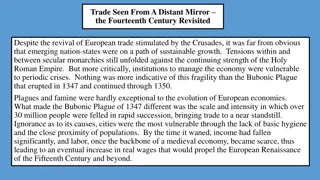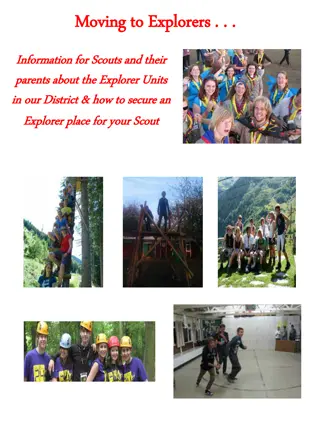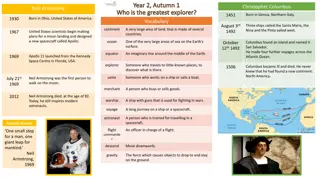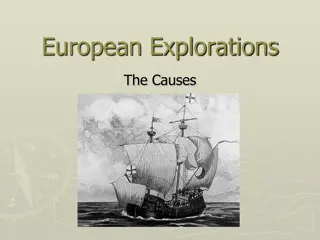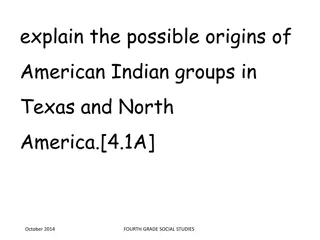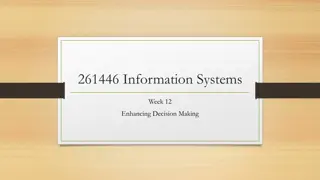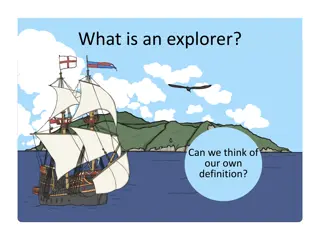Early European Explorers and Decision-Making
In the age of exploration, European explorers ventured into new territories in search of trade routes, resources, and knowledge. They faced challenges, made decisions that shaped history, and interacted with indigenous peoples. Understanding their journeys provides insights into decision-making, relationship-building, and cultural exchange during this transformative period.
Download Presentation

Please find below an Image/Link to download the presentation.
The content on the website is provided AS IS for your information and personal use only. It may not be sold, licensed, or shared on other websites without obtaining consent from the author.If you encounter any issues during the download, it is possible that the publisher has removed the file from their server.
You are allowed to download the files provided on this website for personal or commercial use, subject to the condition that they are used lawfully. All files are the property of their respective owners.
The content on the website is provided AS IS for your information and personal use only. It may not be sold, licensed, or shared on other websites without obtaining consent from the author.
E N D
Presentation Transcript
Called to Leadership: A Biblical Perspective
The Charism and Call to Leadership Leaders act as God s catalysts Leaders operate as problem-discoverers Leaders communicate a compelling vision of a better future
Saint Peter and Saint Paul as Leaders in the Early Church
The call of Saint Peter (Luke 5:1-11) While the crowd was pressing in on Jesus and listening to the word of God, he was standing by the Lake of Gennesaret. He saw two boats there alongside the lake; the fishermen had disembarked and were washing their nets. Getting into one of the boats, the one belonging to Simon, he asked him to put out a short distance from the shore. Then he sat down and taught the crowds from the boat. After he had finished speaking, he said to Simon, Put out into deep water and lower your nets for a catch. Simon said in reply, Master, we have worked hard all night and have caught nothing, but at your command I will lower the nets. When they had done this, they caught a great number of fish and their nets were tearing. They signaled to their partners in the other boat to come to help them. They came and filled both boats so that they were in danger of sinking. When Simon Peter saw this, he fell at the knees of Jesus and said, Depart from me, Lord, for I am a sinful man. For astonishment at the catch of fish they had made seized him and all those with him, and likewise James and John, the sons of Zebedee, who were partners of Simon. Jesus said to Simon, Do not be afraid; from now on you will be catching men. When they brought their boats to the shore, they left everythingand followed him.
The call of Saint Peter (Luke 5:1-11) The divine encounter and commission: Do not be afraid; from now on you will be catching men.
The call of Saint Peter (Luke 5:1-11) Peter s spiritual frame of mind: Jesus encounters Peter at Peter s most intimate level: fear and humility
The call of Saint Peter (Luke 5:1-11) Defining moments in Peter s leadership: Luke 5:1-11: the call of Peter Acts 5:17-42: Trial before the Sanhedrin Acts 10:1-49: Peter and Cornelius Acts 15:1-35: The Council of Jerusalem
The call of Saint Paul (Galatians 1:11-24) Now I want you to know, brothers, that the gospel preached by me is not of human origin. For I did not receive it from a human being, nor was I taught it, but it came through a revelation of Jesus Christ. For you heard of my former way of life in Judaism, how I persecuted the church of God beyond measure and tried to destroy it,and progressed in Judaism beyond many of my contemporaries among my race, since I was even more a zealot for my ancestral traditions. But when [God], who from my mother s womb had set me apart and called me through his grace, was pleasedto reveal his Son to me,so that I might proclaim him to the Gentiles, I did not immediately consult flesh and blood,nor did I go up to Jerusalem to those who were apostles before me; rather, I went into Arabiaand then returned to Damascus. Then after three years, I went up to Jerusalem to confer with Cephas and remained with him for fifteen days. But I did not see any other of the apostles,only James the brother of the Lord. (As to what I am writing to you, behold, before God, I am not lying.) Then I went into the regions of Syria and Cilicia. And I was unknown personally to the churches of Judea that are in Christ; they only kept hearing that the one who once was persecuting us is now preaching the faith he once tried to destroy. So they glorified God because of me.
The call of Saint Paul (Galatians 1:11-24) The divine encounter and commission: But when [God], who from my mother s womb had set me apart and called me through his grace, was pleasedto reveal his Son to me,so that I might proclaim him to the Gentiles.
The call of Saint Paul (Gal 1:11-24) Paul s spiritual frame of mind: Jesus encounters Paul at Paul s most intimate level: arrogance and anger
The call of Saint Paul (Gal 1:11-24) Defining moments in Paul s leadership: Gal 1:11-24: the call of Paul Acts 15:1-35: the Council of Jerusalem Romans 1:16-17: Paul s gospel Acts 28:11-31: Paul under house arrest in Rome
The Council of Jerusalem (Acts 15:1-35) the vision of a better future The Council of Jerusalem convened in 48 AD 15 years after the call of Paul. The early Church faced a schism among its Jewish and Gentile believers. It was a true existential moment. The Church relies on its trust in the Holy Spirit.
The Call to Leadership in the world today 5 Biblical Takeaways 1. God calls us to leadership from the complexities of our lives. 2. Effective leaders are grounded in an intimacy with the Lord. 3. Leaders bring others to encounter Jesus Christ. 4. Leaders are role models of discipleship. 5. Leaders trust the work of the Holy Spirit.
Called to Leadership: A Biblical Perspective






